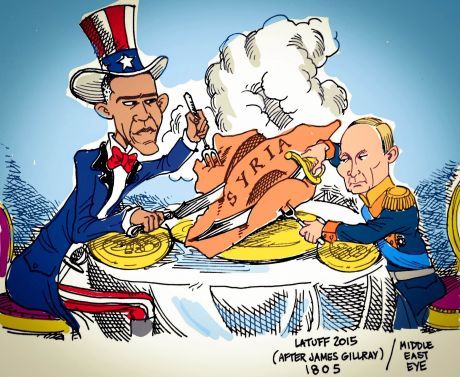What we think
You are here
Syria: neither Washington nor Moscow

November 3, 2015
Russia’s entry into the war in Syria has been hailed by many anti-imperialists as providing the antidote to US power in the region. It is assumed that Russia has no imperial aspirations of its own and will help bring peace by limiting the free hand of the US.
This conclusion is based almost exclusively on a comparison between the relative size of the US versus the Russian footprint in the Middle East and the most recent military interventions of each state.
US imperialism
It is true that the US global military presence is enormous. They are now engaged in military operations in a staggering 135 states around the world. The invasions of Iraq and Afghanistan were war crimes that exposed the US as brutally aggressive in its plans for global domination. The “war on terror” killed more than 1 million people over the last 14 years.
For some, therefore, it makes sense that any other state that is challenging the US must be seen as an ally against imperialism. The desire to build any alternative to this brutality – even one that relies on military intervention by other states – is genuine and is coming from a desire for peace but it represents a failure of political analysis and requires us to ignore the realities of imperial history.
More bombs—just being dropped from different types of jets—will only expand and deepen the crisis that already exists.
Russian imperialism
The smaller size of the Russian military and its lesser role internationally doesn’t change the fundamental dynamic of imperialism, which requires states to intervene militarily to benefit domestic capital. What we are seeing is a Russian state, damaged by sanctions and dropping energy revenue, attempting to reassert itself as a global player.
The relative weakness of the US and it’s failed imperial plans—both the loss of control in Iraq and the lack of a clear strategy in Syria—has provided the opening for Russia.
The western media, of course, opposes Russian involvement. It is both sad and ridiculous to watch western military pundits turn themselves in knots as they condemn Russian bombing as destabilizing for Syria but remain steadfast in their support of coalition bombs which have been destabilizing the area for years.
All foreign military interventions are conducted with the interests of the imperial state at heart. In the case of Syria, Russia is attempting to assert some control over a region that the US hoped would be part of its imperial framework. Russia wants Assad to remain in power to weaken the relative position of the US in the global imperial pecking order.
But the Russian bombing – like the coalition bombing – will only exacerbate the brutal conditions that the people of Syria have had to endure. It will strengthen Assad and result in more killing of those who rose up against him in the first place. The underlying tensions that gave rise to the war in Syria will not go away with a new round of bombing.
Arab Spring
Only the return of the Arab revolutions can bring peace to Iraq and Syria.
The Arab spring uprisings provided a brief glimpse of what the region could look like without imperial interference. Millions took to the streets to oust dictators that were in one way or another supported by the major powers. They brought up the possibility of a true regional mobilization against the interests of the imperialists.
No state will support that kind of revolutionary wave. They will always try to crush it. States are not benign entities. They are an expression of the control of domestic ruling class against working people. Any revolution is therefore seen as a threat to their control.
That is why revolutionaries in the west must remain clearly in support of the movements of the masses against their own states and must never side with governments that crush dissent at home and rule with brutality abroad.
Section:










